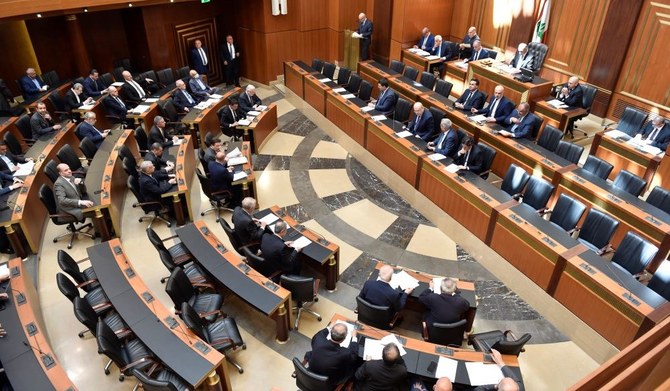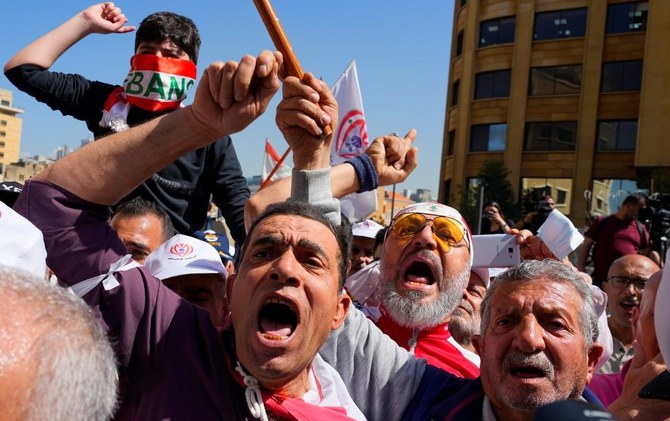BEIRUT: Lebanon’s Parliament on Tuesday voted to extend the terms of municipal council members and other local officials, delaying elections to avoid further political paralysis in the country.
Some members of the parliament, including from the Lebanese Forces party, boycotted the vote, saying elections were a right.
The Lebanese Association for Democratic Elections described the approval of the extension as “undermining the democratic process and the principles of good governance.”
The move is a reflection of the approach that the authority, with its executive and legislative branches, follows in dealing with the democratic process, depriving the Lebanese of their right to choose their representatives, LADE said.
LADE called on MPs opposing the extension to appeal to the Constitutional Council.
In a rowdy session, the MPs passed amendments to the Public Procurement Law amid rejection by civil society organizations that monitor the implementation of the law and ensure transparency in public procurement.
They say that the proposed amendments “distort the law and booby-trap it.”
Seventy-three MPs secured a quorum for Tuesday’s legislative session, although the parliament is constitutionally an electorate body until the election of a new president.
The quorum that was secured for the session is the one that the parliamentary blocs were unable to secure for six months in order to elect a president.
The presidency of the parliament justified the legislative session as necessary because of a deficit in financing the elections.
The session was attended by members of the government, Hezbollah and Amal Movement blocs and their allies, and the Progressive Socialist Party bloc.
Prime Minister Najib Mikati and a number of MPs exchanged accusations in an attempt to disown the political decision to extend the terms of municipal council members.
Mikati told the MPs: “All of you have lied to the Lebanese. The government is being blamed while the government is working. We confirmed our readiness to hold municipal elections.”
Mikati attacked the Free Patriotic Movement party, without naming it, for opposing holding legislative sessions and Cabinet meetings.
Mikati said: “If a party does not want to postpone the elections, it would not have come today to the legislative session. We had more important matters and you did not attend.”
MP Elias Bou Saab, from the FPM bloc, defended his submission of the proposal to extend the municipalities.
The MP added that “departments are closed, and there is no funding according to the government.”
MP Osama Saad said that the government “did not want to hold elections, misled public opinion and (is) now hiding behind parliament.”
Amal Movement MP Ali Hassan Khalil said: “We are postponing the elections so that there will not be a vacuum after the expiration date of the municipalities’ mandate on May 30.”
MP Ahmed Al-Khair defended the prime minister against the FPM MPs, saying: “You are not strong except against the prime minister, and when you attack him, we will respond to you.”
MP Melhem Khalaf, who has been holding a sit-in around the clock with MP Najat Saliba for three months inside the parliament hall, requesting a session to elect the president, left the hall while the legislative session was being held.
Khalaf told Arab News: “Today we have a blatant example of how democracy is undermined in Lebanon.
“We stress that the constitution stipulates that parliament — in light of the presidential vacancy — is an electorate body, not a legislative body, and therefore legislation is prohibited before electing a president.”
Khalaf said that Tuesday’s session “is an encroachment from one authority on another.”
MP Paula Yacoubian said that Tuesday’s legislative session “does not fall within the framework of necessary legislation, especially since the Cabinet said it would meet in the afternoon to secure funds to organize the elections.”
Yacoubian described what happened as “a farce.”
The MPs do not want the people to elect councils of local administrations so that the parties that control the municipalities do not lose their control over them, said Yacoubian.
The Ministry of the Interior, in its response to the “outbids” that took place in parliament, said that “the political will made the parties secure a quorum for the legislative session and agree to postpone the municipal elections, although avoiding the vacuum that the MPs invoked was supposed to happen by holding the elections instead of postponing them.”
The Cabinet – four hours after the parliament session ended — held a meeting that was supposed to discuss financing municipal elections and amending the wages of public sector employees.
The session was held in the wake of anger on the part of retired military members, public school teachers and public sector employees who staged a sit-in at Riad El-Solh Square.
The sit-in turned into a confrontation between riot police and the protesters.
Tear gas was fired at protesters who tried to cut through barbed wire in the vicinity of the government headquarters.
Retired Brig. Gen. Shamel Roukoz said: “People took to the streets because officials did not understand our demands through correspondence and statements.”
Roukoz, a former MP, stressed that “amending wages preserves the dignity of the soldier and the employee, especially retirees who served 40 years in public administrations and military institutions.”
Protesters are demanding a minimum salary of $350 or its equivalent in the national currency, i.e., LBP35 million.
According to the protesters, “the average cost of living today for each family has become LBP40 million ($400).”
Retired Brig. Gen. George Nader said: “The authority relies on patchwork solutions in its decisions. What we are calling for are solutions that are in line with the difficult economic conditions the country is going through.
“The value of salaries is declining day after day due to the fluctuation in the exchange rate of the dollar on the black market.
“Our salaries have collapsed and are no longer worth more than 4 percent of their value, which is unacceptable.”



























